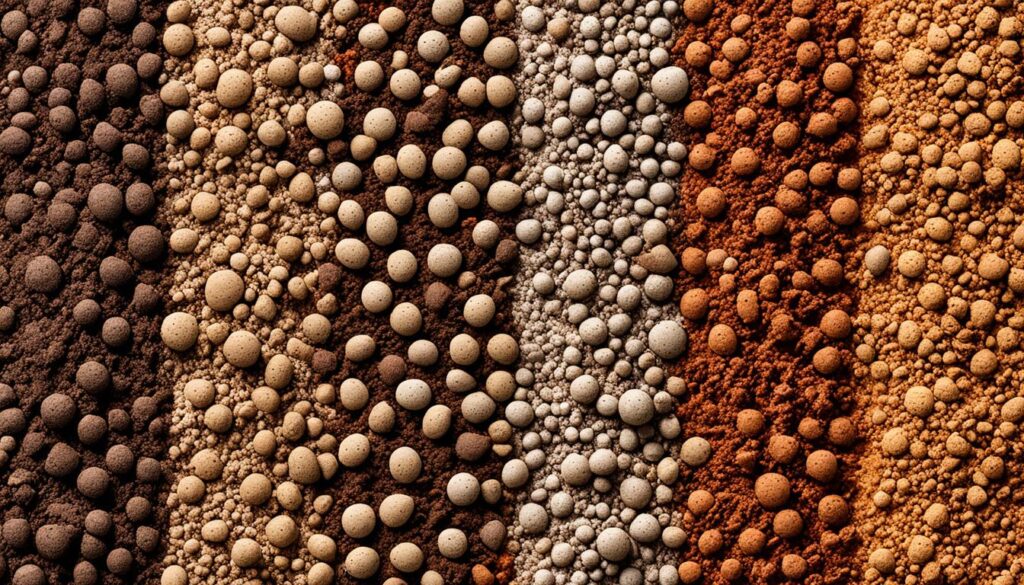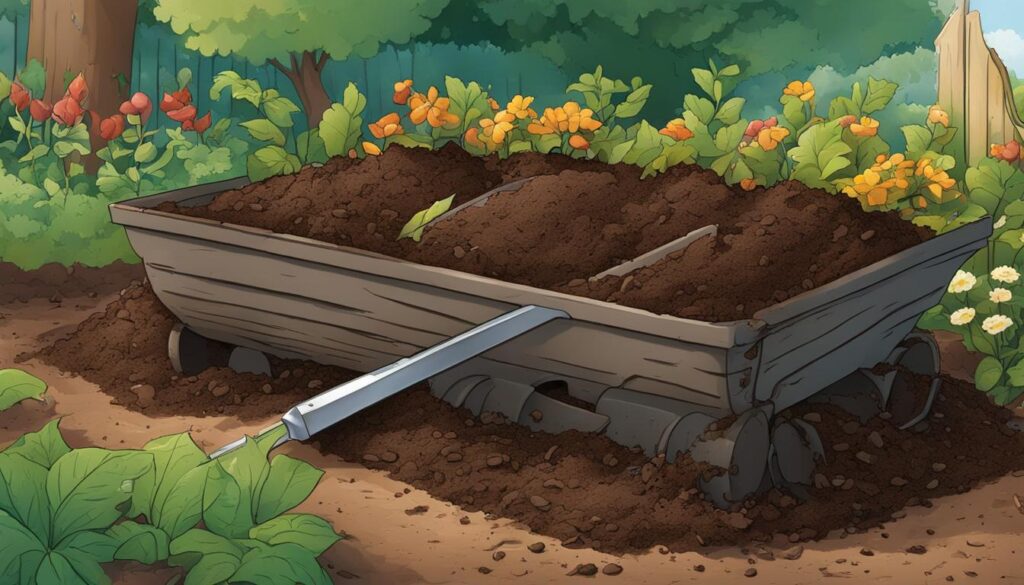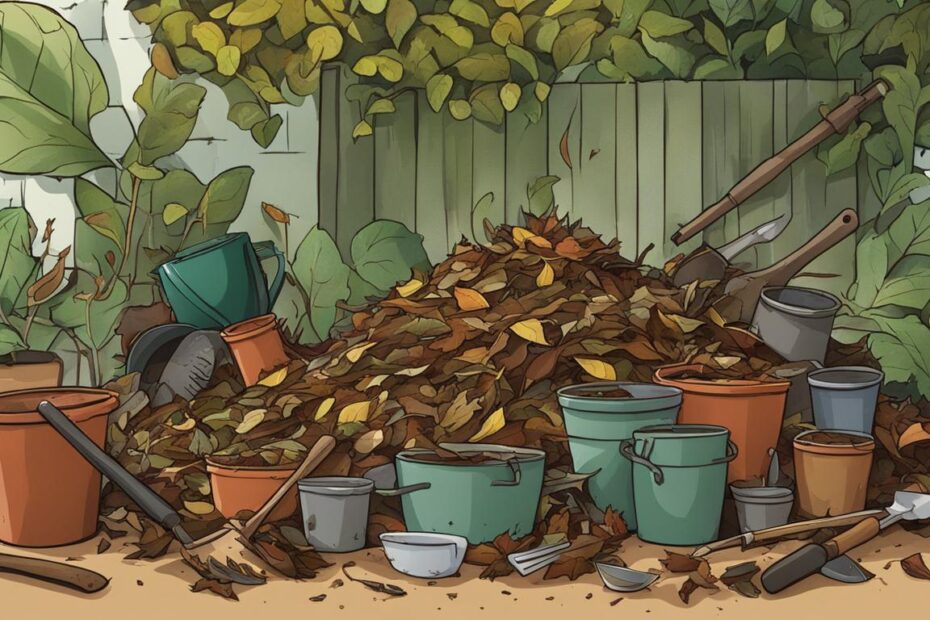Are you looking to transform your garden into a thriving oasis of green? Wondering how to give your plants the best possible start in life? Look no further than organic matter. Yes, you heard it right – organic matter is the secret ingredient that can take your garden from mediocre to magnificent. But what exactly is organic matter, and why is it so essential for garden growth? Let’s dive in and explore the fascinating world of soil enrichment!
Key Takeaways:
- Organic matter is crucial for healthy soil and robust plant growth.
- Healthy soil consists of a balanced mix of mineral particles, water, air, and organic matter.
- Identifying your soil type and understanding its pH level are key to optimizing plant growth.
- Incorporating organic matter, such as compost, improves soil structure and enhances nutrient availability.
- Regular soil testing helps assess pH levels and nutrient deficiencies.
Understanding Healthy Soil and Its Components
Healthy soil is a dynamic ecosystem that provides essential elements for plant growth. It consists of mineral particles, air, water, and organic matter.
Soil serves as a medium for roots to anchor themselves and support plant growth. It provides water to plant roots, which is crucial for their survival. Plant roots also require oxygen, which they absorb from the air in the soil. Nutrients needed for plant growth are dissolved in the moisture between soil particles.
Healthy soil is characterized by its dark, moist, and crumbly texture. It contains air pockets for proper aeration and water retention. Unhealthy soil, on the other hand, may be too dry, compacted, or muddy, hindering plant growth.
| Component | Description |
|---|---|
| Mineral particles | Provide structure and stability to the soil |
| Air | Allows roots to absorb oxygen |
| Water | Provides moisture and facilitates nutrient uptake |
| Organic matter | Nourishes the soil, promotes beneficial organisms, and improves soil structure |
Healthy soil is the foundation for a thriving garden. Understanding its components and providing the necessary care can lead to abundant harvests and beautiful blooms.
Understanding Soil Types and pH
When it comes to gardening success, understanding your soil is key. Different soil types have distinct characteristics and present unique challenges. Clay soils, for instance, tend to be dense and have poor drainage, while sandy soils drain quickly and lack essential nutrients. Silt soils strike a balance between clay and sand, providing better drainage and nutrient retention.
Identifying your soil type is critical for selecting appropriate plants and making necessary amendments to optimize growth. Another crucial factor to consider is soil pH, which measures its acidity or alkalinity. Most plants thrive in slightly acidic soil, with a pH around 6.8. However, there are exceptions; blueberries, for example, prefer more acidic soil to flourish.
Understanding your soil type and pH level allows you to make informed decisions about the plants you cultivate and the amendments needed to create an optimal growing environment.
To adjust soil pH, organic amendments such as limestone or sulfur can be utilized. These natural solutions effectively modify the soil’s acidity or alkalinity, ensuring the right conditions for plant development. Now that you comprehend the significance of soil types and pH, let’s explore how you can improve your soil using organic matter.

Improving Soil with Organic Matter
One of the most effective ways to improve the quality of your soil is by adding organic matter. Organic matter acts as a natural fertilizer, enriching the soil and providing essential nutrients for plant growth. Compost, often called “garden gold,” is a valuable source of organic matter that can significantly enhance the health and productivity of your garden soil.
Compost is rich in nutrients and organic compounds that nourish the soil, promoting the growth of beneficial soil organisms. These organisms, such as earthworms and bacteria, break down the organic matter and release nutrients that are easily absorbed by plants. As a result, plants grow stronger and healthier, with improved resistance to pests and diseases.
In addition to providing nutrients, organic matter improves the structure of the soil. It helps to create a loose and crumbly texture, allowing roots to penetrate easily and access water and nutrients. This improved soil structure also enhances water drainage, preventing waterlogging and reducing the risk of root rot.
Organic matter plays a crucial role in retaining water in sandy soils and improving water-holding capacity in clay soils. For sandy soil, organic matter acts like a sponge, absorbing and retaining moisture that would otherwise drain away too quickly. On the other hand, in clay soils, organic matter helps to break up the particles, allowing water to flow more freely and preventing the formation of compacted layers.

“Compost is often referred to as ‘garden gold’ because of its numerous benefits for soil health and plant growth.” – Jane Doe
You can incorporate organic matter into your soil by regularly adding compost to your garden beds or by using other sources such as animal manure, crop residues, or cover crops. These sources of organic matter can vary in their nutrient content and decomposition rates, so it’s essential to choose options that align with your soil’s needs and the specific plants you’re growing.
By improving your soil with organic matter, you can create a fertile and thriving environment for your plants. The addition of compost and other organic materials will nourish the soil, support beneficial soil organisms, improve soil structure, and promote optimal nutrient retention and water drainage. Take the necessary steps to enrich your soil with organic matter, and you’ll be rewarded with a bountiful and vibrant garden.
The Importance of Soil Testing
Soil testing is a crucial step in understanding the nutrient levels and overall health of your soil. It provides valuable information about pH, nutrient deficiencies, and organic matter content. A soil pH test determines the acidity or alkalinity of the soil and helps determine the appropriate amendments needed. Additionally, nutrient testing can determine the levels of nitrogen, phosphorus, and potassium in the soil, which are essential for plant growth. Based on the test results, you can make informed decisions about the types and amounts of organic amendments to add to your soil.
Practices for Soil Improvement
Improving the health of your soil is essential for cultivating a thriving garden. By implementing effective practices, you can enhance soil quality and provide the optimal conditions for plant growth. Consider the following techniques:
Tilling vs. No Till
The decision to till or not till your soil depends on various factors, such as your specific gardening goals and the condition of your soil. While tilling can help loosen compacted soil and mix in organic matter, it can also lead to soil compaction and disturb beneficial soil organisms. On the other hand, practicing no till involves adding organic matter directly to the soil surface without disturbing its structure. This method helps to preserve soil structure and promote a thriving ecosystem.
Changing Soil pH
The pH level of your soil plays a crucial role in nutrient availability for plants. The majority of plants thrive in slightly acidic soil with a pH around 6.8. However, certain plants, such as blueberries, prefer more acidic soil. If your soil pH needs adjustment, you can use organic amendments like lime to raise the pH or sulfur to lower the pH. Keep in mind that changing soil pH is a gradual process that may require multiple applications over time.
Raised Beds
For gardeners dealing with challenging soil conditions, raised beds can be a beneficial solution. Raised beds allow you to create a controlled environment with specific soil mixtures tailored to your plants’ needs. They also provide better drainage, prevent soil compaction, and allow for easier weed management. By using raised beds, you can improve the overall health and productivity of your garden.
Implementing these practices for soil improvement can greatly enhance the health and productivity of your garden. Whether you choose to till or practice no till, adjusting soil pH, or utilizing raised beds, taking proactive steps to improve your soil will benefit your plants and lead to successful gardening endeavors.
CLICK HERE TO CHECK OUR RECOMMENDED PRODUCTSConclusion
To create a thriving garden, you must prioritize the health of your garden soil. Understanding the composition of soil and how to improve it is essential. Organic matter, such as compost, plays a crucial role in nurturing healthy soil. It provides the necessary nutrients that plants need to grow, promotes beneficial soil organisms, and improves soil structure.
Moreover, organic matter enhances water retention, ensuring that your plants receive adequate hydration. Regular soil testing is recommended to assess pH levels and nutrient deficiencies, allowing you to make informed decisions about soil amendments. By incorporating organic matter and following good practices like tilling, adjusting pH, or using raised beds, you can significantly improve soil health.
Remember, healthy soil is the foundation for a vibrant and productive garden. By prioritizing the well-being of your garden soil and incorporating organic matter, you will create an environment where your plants can thrive and flourish. So, roll up your sleeves, dig in, and watch your garden bloom with life.
FAQ
Why is healthy soil important for garden growth?
Healthy soil provides necessary nutrients, water, and air to support plant growth. It is essential for thriving gardens and plants.
What is the composition of healthy soil?
Healthy soil should contain about 45% mineral particles, 25% water, 25% air, and 5% organic matter.
How can I improve my soil?
Adding organic matter, such as compost, is the best way to improve soil quality. It nourishes the soil, promotes beneficial soil organisms, and improves water retention and soil structure.
Why is soil testing important?
Soil testing provides valuable information about pH, nutrient deficiencies, and organic matter content. It helps gardeners make informed decisions about soil amendments.
Can I change the pH of my soil?
Yes, the pH of soil can be adjusted by adding lime to raise pH or sulfur to lower pH. However, changing pH takes time and may require multiple applications.
Should I till my soil?
The decision to till or not till the soil depends on various factors. Tilling can lead to compaction and weed seed distribution, but it may be beneficial in certain situations.
What are the different types of soil?
There are different types of soil, including clay, sand, and silt. Each has its own characteristics and challenges.
How can I determine my soil type?
Gardeners can determine their soil type by observing its texture and drainage characteristics. Clay soils are compact and drain poorly, sandy soils drain quickly, and silt soils are a balance between clay and sand.
How often should I add organic matter to my soil?
Organic matter, such as compost, can be added regularly to maintain soil health and fertility. It should be incorporated into the soil to enhance its overall health and productivity.
What other sources of organic matter can I use?
Other sources of organic matter include animal manure, crop residues, and cover crops. These can also be used to improve soil quality.
